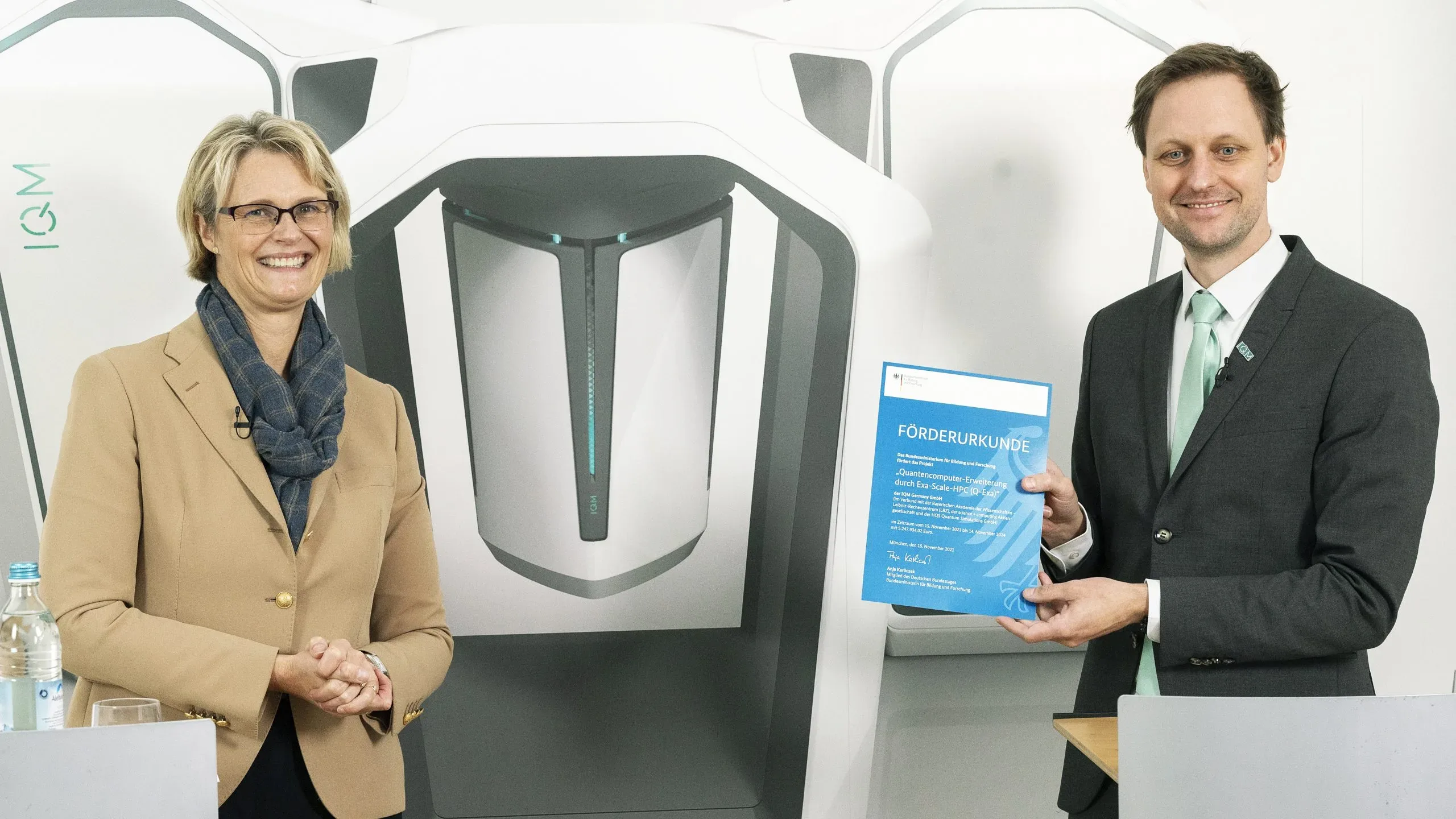As one of the deliverables in a €45.3 million project, quantum computers builder – IQM has been selected to deliver a quantum computing system that will be integrated into an HPC supercomputer.
IQM’s Quantum Computer will be the first gate-based quantum computing system that will be coupled with an industrial-scale HPC environment. The partners are confident that this will make the quantum acceleration of HPC applications a reality.
Quantum technology has the potential to solve computational problems that are beyond our conventional computers. But in order to reach this so-called quantum advantage, researchers will have to overcome several technological hurdles, including the ability to build a large-scale quantum computer that can manage and manipulate quantum information.
This is where Q-Exa steps in. The Q-Exa Consortium was formed to study how best to integrate quantum computing into HPC infrastructure. The consortium’s goal is to incorporate a quantum processor into an existing classical supercomputer. The two machines will then work together to solve problems that are beyond today’s classical machines.
The project aims to integrate a German quantum computer into an HPC supercomputer for the first time. This will enable researchers to test new algorithms on both classical and quantum computers in order to better understand how to get the most out of these systems.
To accelerate the novel discovery process on quantum computers, HPC centers are seeking the best methods to integrate quantum accelerators into their existing computing infrastructure. The integration of quantum computing into a supercomputer is a major step for developing on-site solutions that enable quantum technologies to be used in application-oriented research projects.
Q-Exa will be led by IQM, along with partners from academia, research institutes, industry and the German government. IQM will work with Leibniz Supercomputing Centre, LRZ – one of Germany’s three national supercomputing centers, Europe’s leading HPC and quantum system provider (Atos) and one of Germany’s leading innovators of quantum computing applications (HQS) on this project.
The Q-Exa consortium’s goal to integrate quantum computing systems with HPC aligns with other quantum research projects in the German and European quantum community. Projects such as the digital-analog quantum computation align particularly with the concept of the Q-Exa Co-Design Lab.
The Co-Design Lab will foster a quantum advantage by working with top industry partners to tackle key barriers in developing and deploying quantum computers for commercial use. This aligns with the objective of other consortia such as the QUTAC consortium. On the applications, consortia such as the BMBF projects QLindA, MANIQU and other initiatives support development as industrial use cases can be tested on the Q-Exa demonstrators.
The Q-Exa project aligns with the European strategy of integrating quantum computing accelerators into HPC supercomputers in Europe
“The international race in the field of quantum technologies is in full swing. Germany and the European Union must do their utmost to keep pace in order to guarantee our technological sovereignty. We want to be able to autonomously use the technology and develop it further. The Q-Exa project opens a new promising chapter on our path to a quantum computer ‘made in Germany’. Integrating a quantum computer with the infrastructure of the Leibniz Supercomputing Centre harbours enormous potential for science and industry. The project will contribute to bringing quantum computers close to practice and to provide specific application scenarios for users in science and industry. I am delighted that by launching the project we have reached the first milestone on the way towards a competitive quantum computer ‘made in Germany’.”
Anja Karliczek, Federal Research Minister
“We are pleased to deliver a quantum computing system to LRZ and to work with the consortium partners to integrate this system into a production-grade HPC environment. I am grateful to the Federal Ministry of Education and Research in Germany, which has given us the necessary trust and support for this ambitious project. Together we will work hard to make European technology competitive and develop the most promising hardware solutions for quantum computing here in Germany”.
Dr. Jan Goetz, CEO of IQM Quantum Computers
“The Q-Exa project is key for our activities within the LRZ Quantum Integration Centre (QIC) and the Munich Quantum Valley (MQV). Working with this extremely competitive consortium, we will be able to set European standards that are competitive on a global scale. Ultimately, this will be for the benefit of society as the integration of quantum computing into supercomputers, in particular on the exascale level, will speed up and open vast new research possibilities. It will bring quantum computing to users – both in academia and in industry. And now is exactly the right time to realize this in a data center environment”.
Prof. Dr. Dieter Kranzlmuller, Chairman of the Board of Directors, LRZ
“Technological sovereignty in strategic areas like quantum computing is critical for Europe. With our Quantum Learning Machine (QLM) and strong startup partners like IQM, Atos is proud to contribute to this joint effort. It is time to build the first German quantum computer, connected to an HPC datacenter through our QLM”
Udo Littke, Head of Atos Central Europe.
“Quantum computers will accelerate scientific progress and the development of new technologies in many areas. Chemistry, physics and biology can potentially profit from the ability to perform improved quantum mechanical simulations. Therefore, it is the next logical step to integrate quantum computers into high performance computer centers like the LRZ. We are looking very much forward to connect the end users of the LRZ with the necessary software tools to make full use of the coming computational capabilities”
Dr. Michael Marthaler, CEO HQS Quantum Simulations GmbH.

